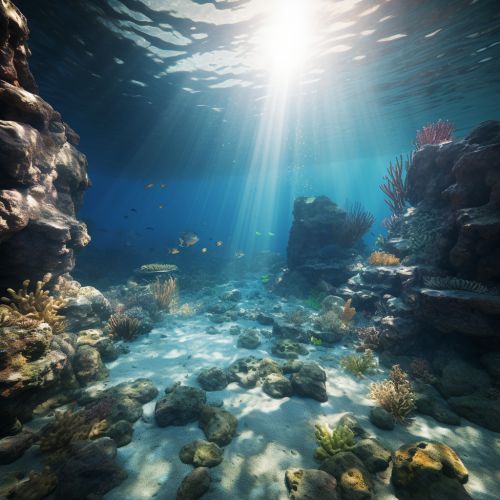Marine Geology
Introduction
Marine geology, a branch of geology, is the study of the history and structure of the ocean floor. It involves geophysical, geochemical, sedimentological and paleontological investigations of the ocean floor and coastal zone. Marine geology has strong ties to physical oceanography and plate tectonics.


History of Marine Geology
The field of marine geology, specifically marine sedimentology, has its roots in the work of Sir John Murray on the Challenger expedition. He conducted a systematic study of marine geology and physical oceanography and published the results in a series of volumes.
Marine Sedimentology
Marine sedimentology is the study of the origins and evolution of sediments in the marine environment. It involves the analysis of sediments, including classification, and interpretation of the processes of transportation and deposition of the sedimentary material.
Types of Marine Sediments
Marine sediments can be classified into four main types: lithogenous, biogenous, hydrogenous, and cosmogenous.
Lithogenous sediments are derived from the erosion of rocks on land, from volcanic eruptions, and from the grinding of the sea floor by icebergs.
Biogenous sediments are made up of the remains of hard parts of once-living organisms, like shells and bones.
Hydrogenous sediments are formed by the precipitation of dissolved minerals from water, often through the action of bacteria.
Cosmogenous sediments are derived from extraterrestrial sources, such as meteorites.
Marine Geophysics
Marine geophysics is the application of geophysical methods to marine geology. It includes the study of the earth's magnetic and gravitational fields, heat flow, electrical conductivity, and seismic activity.
Seafloor Spreading
One of the key discoveries of marine geophysics is seafloor spreading. This process occurs at mid-ocean ridges, where new oceanic crust is formed through volcanic activity and then gradually moves away from the ridge.
Marine Geochemistry
Marine geochemistry involves the study of the chemical composition and processes of the ocean floor and the adjacent coastal zones. It includes the study of the distribution of chemical elements in rocks and sediments, and the processes that led to their distribution.
Ocean Acidification
A major focus of marine geochemistry is the issue of ocean acidification, which is the ongoing decrease in the pH of the Earth's oceans, caused by the uptake of carbon dioxide (CO2) from the atmosphere.
Marine Paleontology
Marine paleontology is the study of the history of life in the ocean, based on the examination of the remains or traces of animals and plants preserved in rocks or sediments on the ocean floor.
Marine Fossils
Marine fossils are the remains or traces of animals and plants that lived in the ocean. They provide valuable information about the history of life in the ocean and the environmental conditions at the time the organisms lived.
Conclusion
Marine geology is a vast field that encompasses many sub-disciplines, including marine sedimentology, marine geophysics, marine geochemistry, and marine paleontology. It provides valuable insights into the history and processes of the ocean floor and the life it supports.
